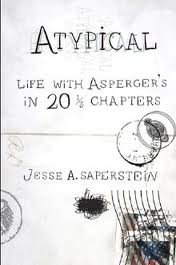What do you think?
Rate this book


Paperback
First published January 1, 2010
Finally, a book on autism that doesn't bank on gifted-level intelligence to make the protagonist likable. Jesse Saperstein doesn't have a photographic/eidetic memory or precocious abilities in mathematics or programming. He studied English, took substitute lectures in high school, and did 12-hour-long graveyard shifts at an IBM facility.
No, he cannot reproduce factoids about criminology or do high-order mathematics for fun. But he struggles to fit into this neurotypical world. He says and does things that the world otherwise thinks are inappropriate, and that is the hallmark of autism.
Atypical is a tell-all memoir that projects ASD as accurately as possible. Saperstein could not tell the capital of Lithuania, but he could write a long letter at Christmas, in which he rambles about things that are inappropriate to write to a stranger. People on the spectrum always struggle not knowing the unspoken boundaries of communication. Saperstein's anecdotes of being labeled a "stalker" for crossing those boundaries feel like a validating experience.
This wickedly honest book rejects all stereotypes that dominate the discourse on ASD, and lays bare some of the uncomfortable truths around ASD. The constant struggle to fit in school and college, the struggle to find a job - something Saperstein has lived through as his life peaked and troughed.